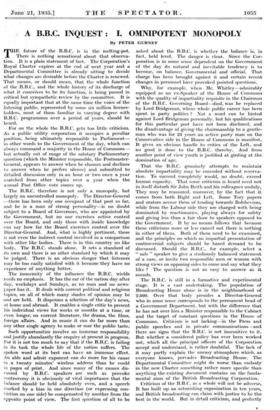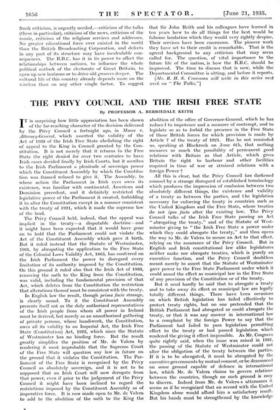A B.B.C. INQUEST : I. OMNIPOTENT MONOPOLY
By PETER GURNEY
THE future of the B.B.C. is in the melting-pot. There is nothing sensational about that observa- tion. It is a plain statement of fact. The Corporation's Royal Charter expires at the end of next year and a Departmental Committee is already sitting to decide what changes are desirable before the Charter is renewed. That means, or should mean, that the whole function of the B.B.C., and the whole history of its discharge of what it conceives to be its function, is being passed in critical but sympathetic review by the committee. It is equally important that at the same time the voice of the listening public, represented by some six million licence- holders, most of them familiar in varying degree with B.B.C. programmes over a period of years, should be beard.
For on the whole the B.B.C. gets too little criticism. As a public utility corporation it occupies a peculiar position, being ultimately responsible to Parliament— in other words to the Government of the day, which can always command a majority in the House of Commons— but actually out of range of the salutary Parliamentary question (which the Minister responsible, the Postmaster- General, appears to answer when he chooses and declines to answer when he prefers silence) and submitted to detailed discussion only in an hour or two once a year snatched from other topics over a year when the annual Post. Office vote comes up.
The B.B.C. therefore is not only a monopoly, but largely an uncontrolled monopoly. The Director-General —there has been only one occupant of that post so far, and he is a man of strong personality—is no doubt subject to a Board of Governors, who are appointed by the Government, but no one exercises active control over the Board, and only those with inside knowledge can say how far the Board exercises control over the Director-General. And, what is highly pertinent, there is not even the indirect control involved in a comparison with other like bodies. There is in this country no like body. The B.B.C. stands alone. It sets a standard of its own and there is no other standard by which it may be judged. There is an obvious danger that listeners may be too easily satisfied with it because they have no experience of: anything better.
The immensity of the influence the B.B.C. wields needs no emphasis. It has the ear of the nation day after day, weekdays and Sundays, as no man and no news- paper has it. It deals with current political and religious topics, on all of which many shades of opinion may be and are held. It dispenses a selection of the day's news, at home and abroad. It enables a single critic to present his individual views for weeks or 'months at a time, or even longer; on current literature, the drama, the films, foreign affairs. And in music it can do far more than any other single agency to make or mar the public taste.
Such opportunities involve an immense responsibility and justify abundantly the enquiry at present in progress. For it is not too much to say that if the B.B.C. is failing in its task the whole life of the nation suffers. The spoken word at its best can have an immense effect. An able and adroit exponent can do more for his cause in a twenty minutes' wireless address than he could in pages of print. And since many of the causes dis- cussed by B.B.C. speakers are such as provoke controversy it is obviously of vital importance that the balance should be held absolutely even, and a speech marked by a bias in one direction (or expressing con- vietion on one side) be compensated by another from the Opposite point of view. The first question of all to be asked about the B.B.C. is whether the balance is, in fact, held level. The danger is clear. Since the Cor- poration is in some sense dependent on the Government of the day its natural and inevitable tendency is to become, on balance, Governmental and official. That charge has been brought against it and certain recent changes in personnel have provoked pointed questions.
Why, for example, when Mr. Whitley—admirably equipped as an ex-Speaker of the House of Commons with the quality of impartiality requisite in the Chairman of the B.B.C. Governing Board—died, was- he replaced by Lord Bridgeman, whose whole public career has been spent in party politics ? Not a word can be hinted against Lord Bridgeman personally, but his qualifications for this particular post have not been disclosed, and the disadvantage of giving the chairmanship to a gentle- man who was for 23 years an active party man on the Conservative side in the House of Commons is manifest. It gives an obvious handle to critics of the Left, and no good is done to the B.B.C. thereby. And from another point of view youth is justified at girding at the domination of age.
That the B.B.C. genuinely attempts to maintain absolute impartiality may be conceded without reserva- tion. To succeed completely would, no doubt, exceed human capacity. That some criticism is heard need not in itself disturb Sir John Reith and his colleagues unduly. They may be reassured, moreover, by the fact that it comes from both Right and Left. Some Tory papers and orators accuse them of tending towards Bolshevism, while from the Labour side they are charged with being dominated by reactionaries, playing always for safety and giving less than a fair show to speakers opposed to the Government. It by no means follows that because these criticisms more or less cancel out there is nothing in either of them. Both of them need to be examined, and the principles on which an impartial presentation of controversial subjects should be based demand to be discussed. Should the B.B.C., for example, select a " safe " speaker to give a studiously balanced statement of a case, or invite two responsible men or women with strong views on opposing sides to come and say what they like ? The question is not so easy to answer as it sounds.
The B.B.C. is still in a formative and experimental stage. It is a vast undertaking. The population of Broadcasting House alone is in the neighbourhood of 2,000. Over that body presides a Director-General who in some sense corresponds to the permanent head of a Government Department, but with the difference that he has not over him a Minister responsible to the Cabinet and the target of constant questions in the House of Commons. Criticism is not lacking—in the Press and public speeches and in private communications—and there are signs that the B.B.C. is not insensitive to it. But whether a considered policy has ever been worked out, which all the principal officers of the Corporation accept and understand, is rather doubtful. The lack of it may partly explain the uneasy atmosphere which, as everyone knows, pervades Broadcasting House. The Departmental Committee might do worse than embody in -the new Charter something rather more specific than anything the existing document contains on the funda- mental aims of the British Broadcasting Corporation.
Criticism of the B.B.C. as a whole will not be adverse. It has built up an astonishing organization in ten years, and British broadcasting can claim with justice to be the best in the world. But in detail criticism, and perfectly frank criticism, is urgently needed,—criticism of the talks (these in particular), criticism of the news, criticism of the music, criticism of the religious services and addresses. No greater educational force ever existed in the world than the British Broadcasting Corporation, and defects in any part of its structure may have incalculable con- sequences. The B.B.C. has it in its power to affect the relationships between nations, to influence the whole political outlook of the electorate of Great Britain, to open up new horizons or to drive old grooves deeper. The cultural life of this country already depends more on the wireless than on any other single factor. To suggest that Sir John Reith and his colleagues have learned in ten years how to do all things for the best would be fulsome laudation which they would very rightly despise. Their services have been enormous. The pioneer work they have set to their credit is remarkable. That is the agreed background to any criticism that may seem called for. The question, of vital importance to the future life of the nation, is how the B.B.C. should be improved. The time to discuss that is now, while the Departmental Committee is sitting, and before it reports.
[Mr. R. II. S. Crossman will write in this series next week on " The Talks."]









































 Previous page
Previous page